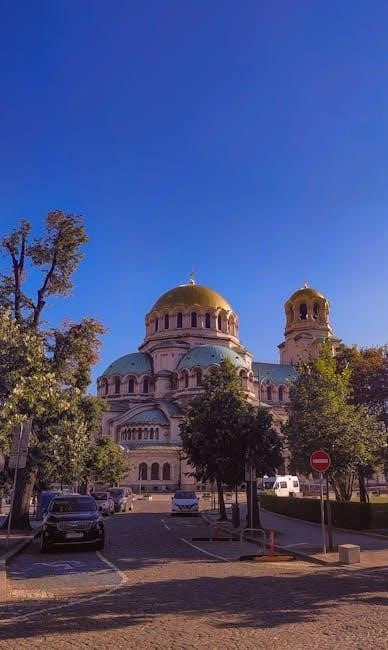Jostein Gaarder’s El Mundo de Sofía is a philosophical novel exploring existentialism and history of philosophy through Sofía Amundsen’s journey. Available as a PDF globally, it captivates readers with its deep themes and storytelling, making it a cult classic for both adolescents and adults.
Overview of the Book
El Mundo de Sofía is a philosophical novel by Jostein Gaarder, blending philosophy with fiction. It follows Sofía Amundsen, a teenager who receives mysterious letters exploring existential questions and the history of philosophy. The story unfolds through her interactions with a secretive figure, guiding her through a metaphysical journey. The book combines deep philosophical concepts with an engaging narrative, making it accessible to readers of all ages.
Author Background: Jostein Gaarder
Jostein Gaarder is a Norwegian author and intellectual, renowned for his ability to blend philosophy with storytelling. His works, particularly El Mundo de Sofía, have gained global acclaim for their thought-provoking themes. Gaarder’s writing often explores existentialism and environmental issues, reflecting his deep engagement with philosophical inquiry and societal challenges, making him a respected voice in contemporary literature.

Plot Summary of “El Mundo de Sofía”
Sofía Amundsen, a 15-year-old, embarks on a philosophical journey through mysterious letters, exploring life’s meaning and history of philosophy, leading to her profound awakening.

Key Characters and Their Roles
Sofía Amundsen, the protagonist, is a curious teenager exploring philosophy. The unknown philosopher guides her through mysterious letters. Jorunn, Sofía’s mother, represents practicality. Alberto Knox, a philosopher, mentors Sofía, aiding her intellectual journey.
Philosophical Journey of Sofía Amundsen
Sofía’s journey begins with mysterious letters, prompting deep reflections on existence. She explores major philosophical concepts, from Plato’s Theory of Ideas to existentialism, transforming her perspective on life and reality. This journey highlights her growth from innocence to philosophical awareness.
Philosophical Themes Explored
Existentialism and the history of philosophy are central, guiding Sofía’s reflections on existence and reality. The novel also touches on environmental themes, emphasizing humanity’s connection to the planet.
Existentialism and the Meaning of Life
The novel delves into existentialism, exploring Sofía’s journey of self-discovery and the search for life’s meaning. Through her experiences, Gaarder examines fundamental questions about existence, freedom, and purpose, inviting readers to reflect on their own lives and the human condition.
History of Philosophy Through the Storyline
The novel intricately weaves the history of philosophy into Sofía’s journey, guiding her through the ideas of ancient Greek thinkers, medieval philosophers, and modern theorists. Each chapter seamlessly introduces key philosophers, making complex concepts accessible and engaging for readers of all ages.
Symbolism in the Novel
The novel uses rich symbolism, with Sofía’s garden representing innocence and knowledge, while mysterious letters and puzzles embody the search for truth and understanding.
The Garden of Eden as a Metaphor
The Garden of Eden in El Mundo de Sofía symbolizes innocence and the pursuit of knowledge. Sofía’s journey mirrors the biblical story, as she uncovers truths about existence and human curiosity. The garden represents a paradise of ignorance, while her philosophical awakening signifies the loss of innocence, paralleling humanity’s eternal quest for understanding. This metaphor enriches the novel’s exploration of existential themes and the meaning of life.
Symbolic Elements in Sofía’s Adventures
Sofía’s journey is filled with symbolic elements, such as mysterious notes and a stranger guiding her through philosophical concepts. These symbols represent curiosity, growth, and the pursuit of truth. The notes spark her intellectual awakening, while the stranger embodies the Socratic method, prompting self-reflection. Together, these elements weave a narrative rich in depth, inviting readers to explore life’s profound questions alongside Sofía.

Reception and Impact of the Book
El Mundo de Sofía has gained global popularity, becoming a cult classic. Its philosophical depth resonates with readers, making it a significant work in modern literature, widely available as a PDF.
Global Popularity and Cultural Significance
El Mundo de Sofía has become a global bestseller, transcending Norway to resonate with readers worldwide. Its unique blend of philosophy and storytelling has made it a cultural phenomenon, appealing to both adolescents and adults; The book’s availability in PDF format has further amplified its reach, ensuring its ideas and themes are accessible to a diverse audience, solidifying its place in modern literary history.
Academic and Reader Reviews
El Mundo de Sofía has received widespread acclaim for its engaging approach to philosophy. Readers praise its ability to simplify complex ideas, making them accessible to all. Academically, it is valued for its unique storytelling method, which effectively teaches philosophical concepts. Its success as a bestseller underscores its appeal, resonating with both casual readers and scholars, solidifying its reputation as a thought-provoking and impactful work.

Downloading “El Mundo de Sofía” in PDF
El Mundo de Sofía is widely available as a PDF download on platforms like uDocz, Scribd, and Docsity. Many sources offer free access, making it easily accessible worldwide.
Available Platforms for Download
The PDF version of El Mundo de Sofía can be downloaded from various platforms, including uDocz, Scribd, and Docsity; These sites offer easy access to the novel, with some sources providing free downloads. Additionally, platforms like Google Books and academic repositories often host the file, ensuring widespread availability for readers worldwide.
Legal and Free Sources
Several legal and free sources offer El Mundo de Sofía in PDF format. Platforms like uDocz and Scribd provide direct downloads, while academic repositories ensure compliance with copyright laws. Additionally, public domain libraries and educational websites often share the novel, making it accessible to readers without compromising on legality or quality.
The Book’s Relevance in Modern Times
El Mundo de Sofía remains relevant today, addressing environmental themes and encouraging philosophical discussions in the digital age. Its exploration of life’s meaning resonates with modern readers, making it a timeless reflection on current issues and sustainability concerns.
Philosophical Discussions in the Digital Age
El Mundo de Sofía sparks contemporary philosophical debates, especially in the digital era. The novel’s exploration of existentialism and the meaning of life encourages readers to reflect on identity, technology, and ethics, making it a valuable resource for modern discussions about humanity’s role in an increasingly digital world.
Environmental Themes and Current Issues
El Mundo de Sofía highlights environmental themes, reflecting Gaarder’s concern for planetary health. The novel’s philosophical journey mirrors humanity’s role in nature, urging responsibility. Its exploration of existentialism ties into modern eco-crisis discussions, emphasizing sustainability and ethical stewardship of Earth, resonating with current global issues like climate change and conservation.
Educational Value of “El Mundo de Sofía”

El Mundo de Sofía is widely used in educational settings, encouraging students to engage with philosophical concepts and think critically about life’s fundamental questions.
Use in Philosophy Classes
El Mundo de Sofía is a valuable resource in philosophy education, offering an engaging narrative that simplifies complex concepts. Its exploration of existentialism, history of philosophy, and ethical questions makes it an ideal text for stimulating discussions and debates in classrooms, fostering a deeper understanding of philosophical ideas among students. Teachers often integrate it into curriculums to encourage critical thinking and curiosity about life’s fundamental questions.
Encouraging Critical Thinking in Readers
El Mundo de Sofía fosters critical thinking by presenting philosophical concepts through Sofía’s personal journey. The novel’s narrative style encourages readers to question, reflect, and explore existential themes independently. By blending storytelling with deep philosophical inquiry, it prompts readers to engage actively with ideas, making it a powerful tool for intellectual growth and self-reflection in both young and adult audiences.
El Mundo de Sofía remains a timeless philosophical journey, inspiring readers to explore existential questions and historical ideas. Its global popularity and educational value ensure its lasting legacy, making it a must-read for those seeking intellectual and emotional enrichment.
Final Thoughts on the Novel’s Legacy
El Mundo de Sofía has cemented its place as a philosophical masterpiece, inspiring countless readers to explore existential questions and historical ideas. Its availability in PDF format ensures accessibility, while its educational value and ability to encourage critical thinking solidify its impact. The novel’s legacy endures, resonating with both adolescents and adults, making it a timeless and influential work in modern literature.
Recommendations for Further Reading

For deeper philosophical exploration, readers of El Mundo de Sofía may enjoy Jostein Gaarder’s The Solitaire Mystery and Vita Brevis. Additionally, works by existentialist thinkers like Simone de Beauvoir and Albert Camus, such as The Ethics of Ambiguity and The Myth of Sisyphus, offer complementary insights into the themes of existence and meaning explored in Gaarder’s novel.
